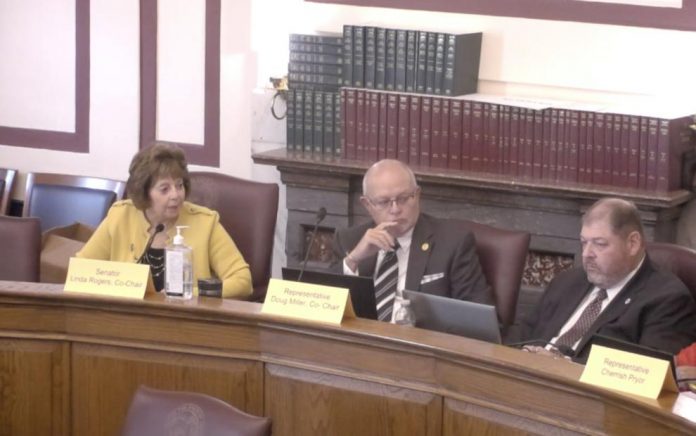Statehouse Task Force Passes Final Report Aimed At Addressing The Housing Shortage
- By Jack Sells, TheStatehouseFile.com
- Â
INDIANAPOLIS—On Thursday morning, the Housing Task Force met for the third time since Sept. 29 to revise and adopt a final report, going through 15 “findings and recommendations†for the General Assembly and Gov. Eric Holcomb.

The committee, headed by Rep. Doug Miller, R-Elkhart, and Sen. Linda Rogers, R-Granger, recommended that the state provide loans and grants to help fund housing infrastructure, saying it “will pay off in private-sector investment and economic growth.â€
It also suggested implementing both “tax incentives for homeownership programs targeted at first-time buyers or low-income buyers†and “state funding for financial literacy efforts†related to homeownership.
“[A]s a former teacher that taught this, I think this is really a great point and something that everyone really needs to understand—what it costs to own a home,†Rogers said.
Miller said he was excited to see point No. 8, which suggests using more Regional Economic Acceleration and Development Initiative funds for housing projects, as “READI actually is targeted more broadly across the state … So it gets into even some of our smallest communities, so it has the opportunity to make the largest impact.â€
READI, according to the state’s website, takes “state appropriations to promote strategic investments that will make Indiana a magnet for talent and economic growth.â€
“Housing requests comprised 30% of all funding request[s] in the first round of READI, but more could be done to promote projects that result in the highest end use of limited grant dollars,†the task force’s final report reads.
One recommendation that the committee altered slightly was the proposal to “consider voluntary revisions in local zoning.â€
An example the report gave for the recommendation was the “waiver or elimination of unnecessary regulations,†and some members successfully advocated for the removal of “unnecessary.â€
Jeremy Stutsman, mayor of Goshen and representative for Advancing Indiana Municipalities, first questioned the inclusion of the word, saying it was subjective.
Different numbers were thrown around for what percentage of costs for building a home is due to regulations—Rogers said 25% while Gina Leckron, Habitat for Humanity of Indiana’s director, said 20%—but both said it was a reason for supporting the recommendation because if some regulations were removed, then the price of building a house would go down.
“Regulations imposed by all levels of government account for $93,870, or 23.8% of the current average sales price ($397,300) of a new single-family home,†said the National Association of Home Builders, referencing a NAHB study. It lists “hard costs of compliance,†such as fees, as the top regulatory cost during lot development and “changes to building codes over the past 10 years†during construction.
Other suggestions from the task force included “faster approval times for construction permits and timely inspections of projects at the local level†and allowing a half year between the passing of new building codes and when they take effect.
There was consternation among some members regarding a part of the report that said the committee is against “new sales taxes on services.â€
While Indiana currently does not tax services, Stutsman said it was a broad position for the group to take and if the General Assembly did want to pass a tax on services, it may be for good reason.
Miller disagreed, saying a tax on the services that go into homebuilding, like framing, plumbing and electrical work, would work against what the task force is trying to accomplish.
“So I feel strongly enough about this that I think that this needs to stay in that policy statement,†said Miller.
The biggest change made to the report was the inclusion of a 16th recommendation, after Sen. Fady Qaddoura, D-Indianapolis, expressed concern that there was nothing addressing the problem of landowners not keeping properties safe and up to standard.
The new addition—which said, “Support addressing substandard housingâ€â€”was suggested by Miller to appease Qaddoura, who responded with a moment of thankfulness.
“You did an amazing job,†Qaddoura said, referring to the two Republican co-chairs. “You’ve been transparent, you’ve been inclusive, you’ve been asking people to testify.â€
The new substandard housing recommendation was “the final piece that will … help me fully endorse and support this report publicly and privately,†Qadoura said.
The final report passed 10-2, with Rep. Cherrish Pryor, D-Indianapolis, and Stutsman voting no. It will now go to the Legislative Service Agency and then the General Assembly and governor.





